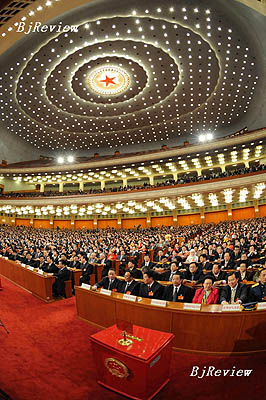|

They came from all corners of the country to deliberate, discuss and determine the future of China for the next five years and look at lessons learned in the past five-year period of governance. A large turnout of approximately 3,000 deputies to the National People's Congress (NPC) and more than 2,000 members of the National Committee of the Chinese People's Political Consultative Conference (CPPCC) gathered in Beijing on March 3-18 for their annual full sessions, watched by a battery of media personnel from across the world.
The First Session of the 11th NPC and the First Session of the 11th CPPCC National Committee were considered of great significance because they were convened as the country celebrates the 30th anniversary of its reform and opening up. They were also the first meetings after the 17th National Congress of the Communist Party of China held in October 2007, to convert strategic thoughts of the Party congress into action plans.
The NPC session endorsed the government work report and other reports, summarized the work in all areas in the past five years, proposed the agenda for 2008 and the next five years, and elected and approved top state and government leaders.
At the CPPCC session, more than 4,000 proposals, covering issues from macro-adjustment to aspects related to people's livelihood, were submitted. Most of them were later transferred to relevant government departments, which are held responsible for answering complaints, resolving problems and adopting good suggestions. The session also witnessed the emergence of a new and younger leadership of the CPPCC, China's top advisory body.
The NPC and CPPCC sessions are the most important political events for China this year. They provide important forums and communication channels between the political elite and the general public amid rapid social changes. Focal points of public concerns include the government work report, government institutional restructuring and the new lineup of leadership, among others.
Highlights of the government work report include insisting on a prudent fiscal policy and a tight monetary policy, achieving gross domestic product growth of about 8 percent and controlling inflation, and restricting the rise of the consumer price index to around 4.8 percent.
The government restructuring plan was one of the most anticipated events of the NPC session. This reform was approved by lawmakers and is expected to regroup resources, improve efficiency and upgrade the administrative system to better suit China's economic and social development.
Also at the NPC session, Hu Jintao, Wen Jiabao and Wu Bangguo were reelected or re-approved for their second term of another five years as president of the state, premier of the State Council and chairman of the NPC Standing Committee, respectively; Xi Jinping was elected as vice president; Li Keqiang, Hui Liangyu, Zhang Dejiang and Wang Qishan were approved as vice premiers. The younger and professional faces in the new lineup, armed with experience of governing provinces and knowledge of macroeconomy, naturally take the stage. With no doubt, the Chinese people have high expectations for the new leadership.
Representing the new leadership, President Hu vowed to spare no effort to live up to the trust and expectations of the people and seek clean governance and appropriate use of power to serve the people wholeheartedly, at the closing meeting of the NPC session. "I will serve the people and exert myself to work for the country, be a good civil servant and sincerely seek benefits for the people," Hu said . "I will do my utmost not to let you down."
Hu said the new leadership is willing to accept supervision from the people, strictly exercise self-discipline, and serve the country and the people in a cautious, conscientious and "clean-handed" way. "We will keep to the principle of ‘putting people first,' respect the people's status and safeguard their rights and interests," he said.
China's new leadership, he said, will advance democracy and the rule of law, unswervingly maintain the uniformity, solemnity and authority of the socialist legal system, promote social equity and justice, and safeguard social harmony and stability. | 